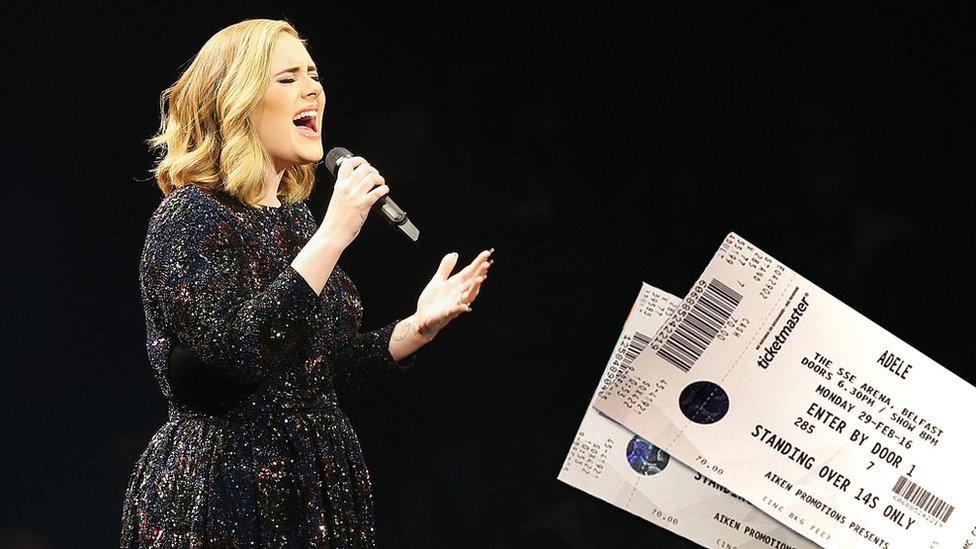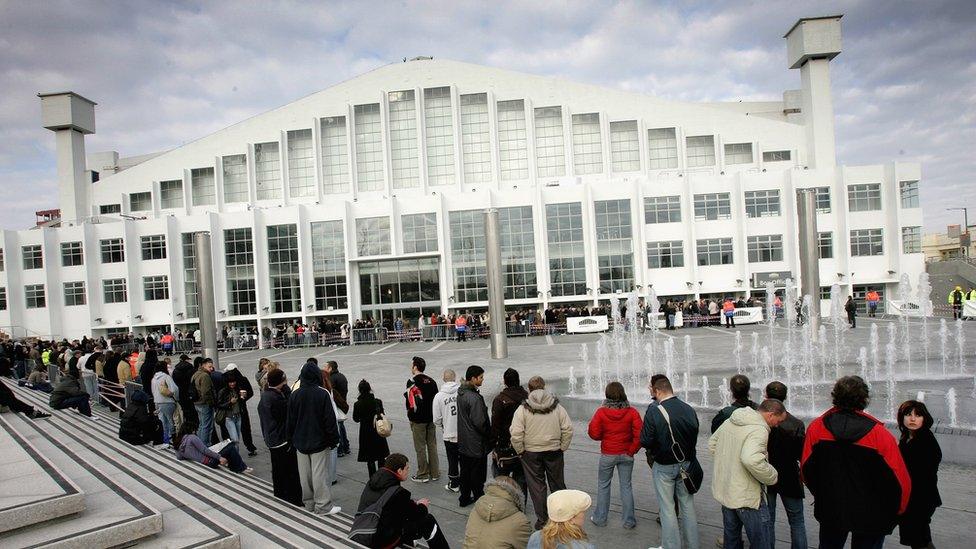Ticket sites 'must do more to fight touts'
- Published

Tickets for Adele's tour were advertised on secondary tickets sites for up to £25,000 each
Companies like Ticketmaster should take more action to prevent touts "harvesting" concert tickets, a government review has recommended.
It says the current measures are inadequate, and suggests buyers should be forced to give proof of ID.
The report, external also challenges re-sale sites to observe the law, by displaying the original face value of any tickets they list for sale.
A recent survey by Which? found the rules were consistently being breached.
While it is not illegal to re-sell tickets, it is thought that some of the selling patterns are only possible because of software known as "bots", which automatically sweep up huge numbers of tickets the moment they go on sale. Touts then resell them at a profit on secondary market websites.
Tickets to see Radiohead in the UK this week are being advertised for as much as £6,000 - nearly 100 times face value - but that pales in comparison to Adele.
In February, it emerged that tickets for her UK tour were being advertised for £25,000 each.
The singer called out the touts during one of her recent London shows, calling them "terrible people".
"I hope no one paid that much," she said. "If you did, I'll pay you back."
However, secondary sites say these highly-priced tickets rarely sell.

Little Mix, whose Get Weird tour is the biggest arena tour of the year, have called for action on touts
Sir Elton John has also branded secondary ticket sites "disgraceful" and urged fans not to pay over the odds, telling the BBC: "I'd rather have empty seats."
Meanwhile, an anti-touting petition launched by the unlikely combination of Mumford and Sons and Little Mix three weeks ago has already attracted 42,000 signatures, external.
Glastonbury praised
The government review was authored by Professor Michael Waterson, economics professor at Warwick University.
He said primary sites like Ticketmaster, Ticketweb and Seetickets should "take seriously the possibility of mass purchase by individuals using bots who have no intention of attending the event and guard against this".
"Mass purchases of this kind are usually undertaken with a view to resale at a profit, resulting in the primary sites selling out very quickly and tickets ending up on the secondary ticketing market at inflated prices."
He praised Glastonbury's ticketing model, whereby tickets are "deliberately personalised" and ID is checked at the gates - and encouraged more sellers to introduce ID requirements.
Professor Waterson was also critical of ticket pre-sales, revealing that often "85-90% of a venue's inventory has already been sold" by the time the general sale begins.
He also cited oral evidence suggesting that some concert promoters "quietly" gave tickets to secondary sites at higher prices "because they recognise the gains to be made".

Last year, One Direction teamed up with the Twickets app so fans could buy re-sale tickets at face value
The review also looked at whether consumers were being sufficiently protected by the Consumer Rights Act 2015.
Under the law, buyers must be told the original face value of any tickets being resold and, where appropriate, the seat numbers and any other restrictions - for example age limits.
But a Which? survey of the four main ticketing sites - Viagogo, Seatwave, Stubhub and Getmein! - found "numerous examples" of the rules being breached.
Professor Waterson agreed that the sites needed to be monitored more closely, perhaps by Trading Standards, and penalties imposed when they broke the rules.
However, he dismissed calls for an outright ban on the secondary market, arguing it would simply drive the sector underground.
He added that around 30% of tickets on resale sites were sold below face value, thus "offering a useful service to consumers".
'No' to price capping
During the consultation, many fans asked the government to prevent tickets being resold at a profit, capping the price at 10% above the original face value.
However, Professor Waterson vetoed the idea, saying it would be "difficult to police" and arguing it would "legitimise" touting through legislation.
His report was given a cautious welcome by musicians including Arctic Monkeys, One Direction, Florence + the Machine, Ed Sheeran and Iron Maiden.
A joint statement, signed by their managers, said: "Professor Waterson exposes a dysfunctional and under-regulated ticketing market. His review calls on Government to enforce the law, and for secondary ticketing sites to apply the law and show responsibility.
"We believe that fans should be given every opportunity to buy and exchange tickets at the price they were intended - not see them used as collateral to boost the profits of scalpers."
A spokesperson for Stubhub, which is owned by eBay, said: "We welcome Professor Waterson's recognition of the benefits for consumers from the secondary market and his decision to reject further legislation at this stage, including price caps.
"But we are concerned that there are still insufficient legal safeguards to stop event organisers using row and seat number details to cancel, without compensation, tickets offered for resale. Transparency should not come at the expense of people's right to resell their tickets."
Shadow sports minister Clive Efford said: "The Government was forced to concede to a number of Labour's demands on the secondary ticketing market during the passage of the Consumer Rights Act.
"This report shows that secondary ticketing companies are ignoring existing regulations and that there is no enforcement taking place.
"Due to the Government dragging its feet on this issue, sports fans have been needlessly ripped off for tournaments such as the Rugby World Cup, the Ashes and currently the European Football Championship."

- Published25 May 2016

- Published25 May 2016

- Published16 December 2015

- Published17 December 2015

- Published9 May 2016
